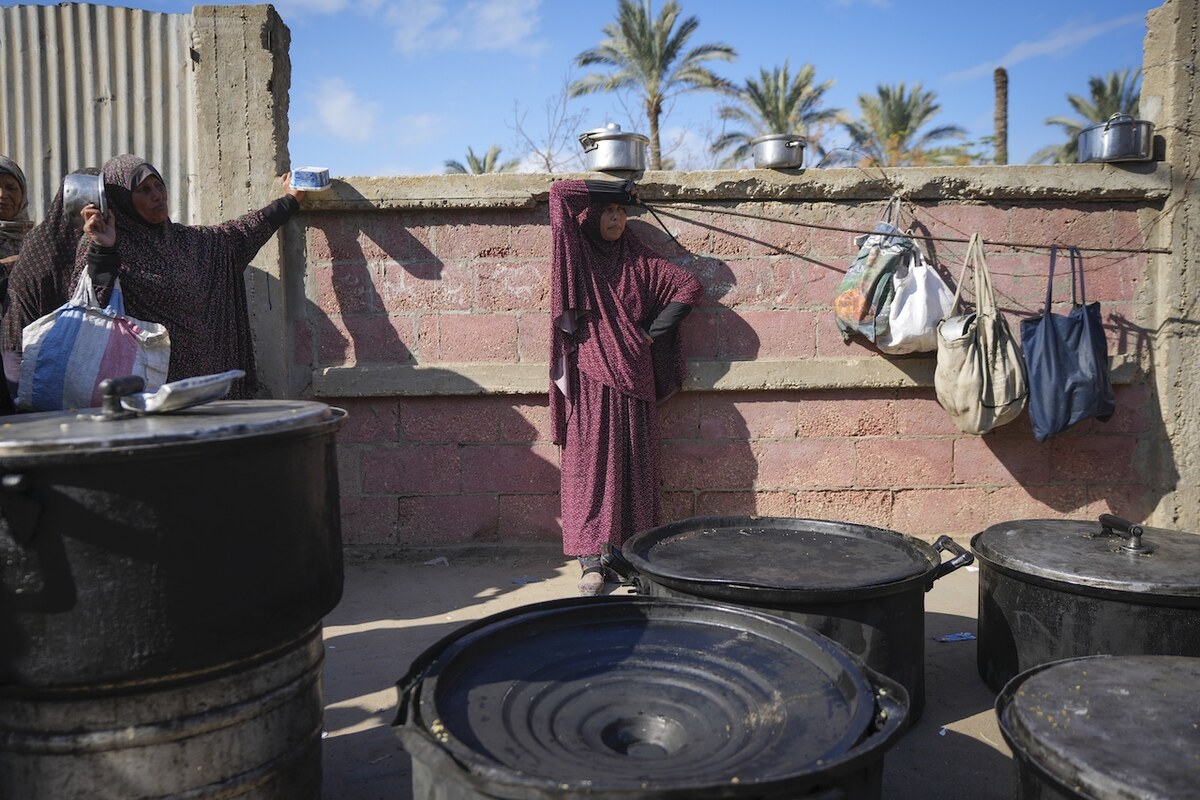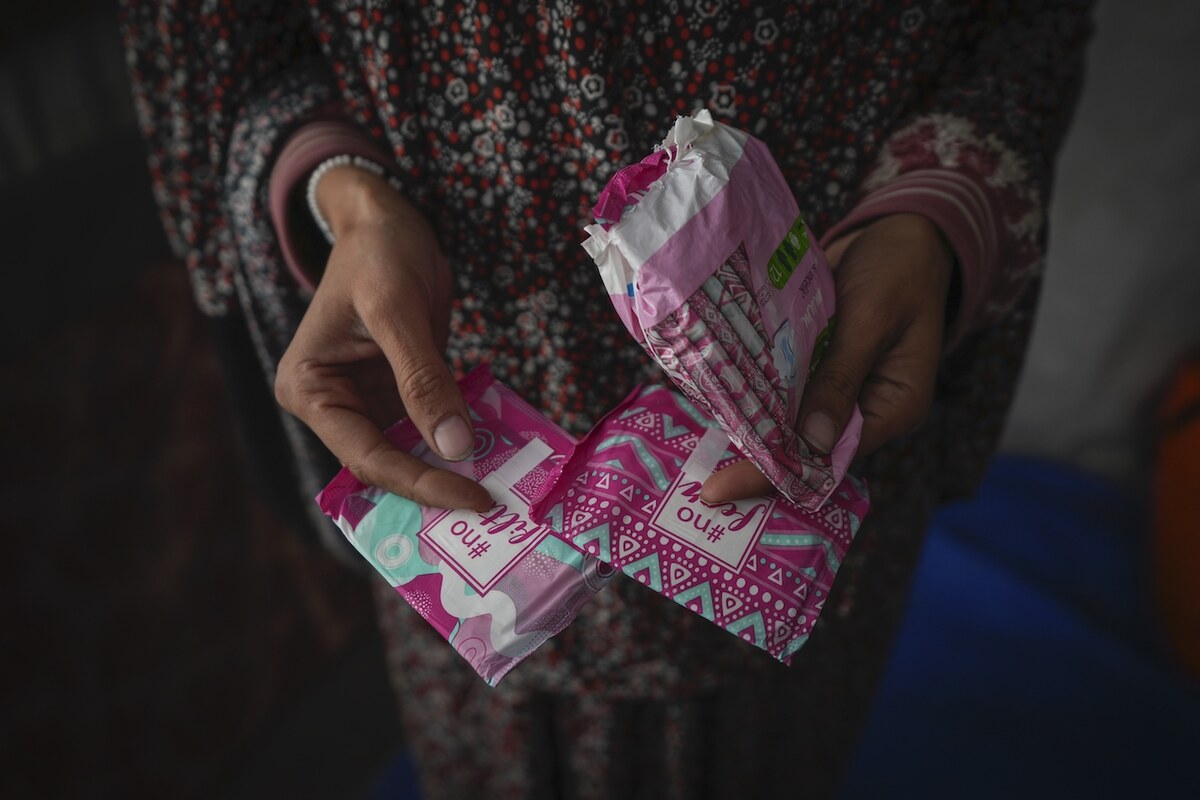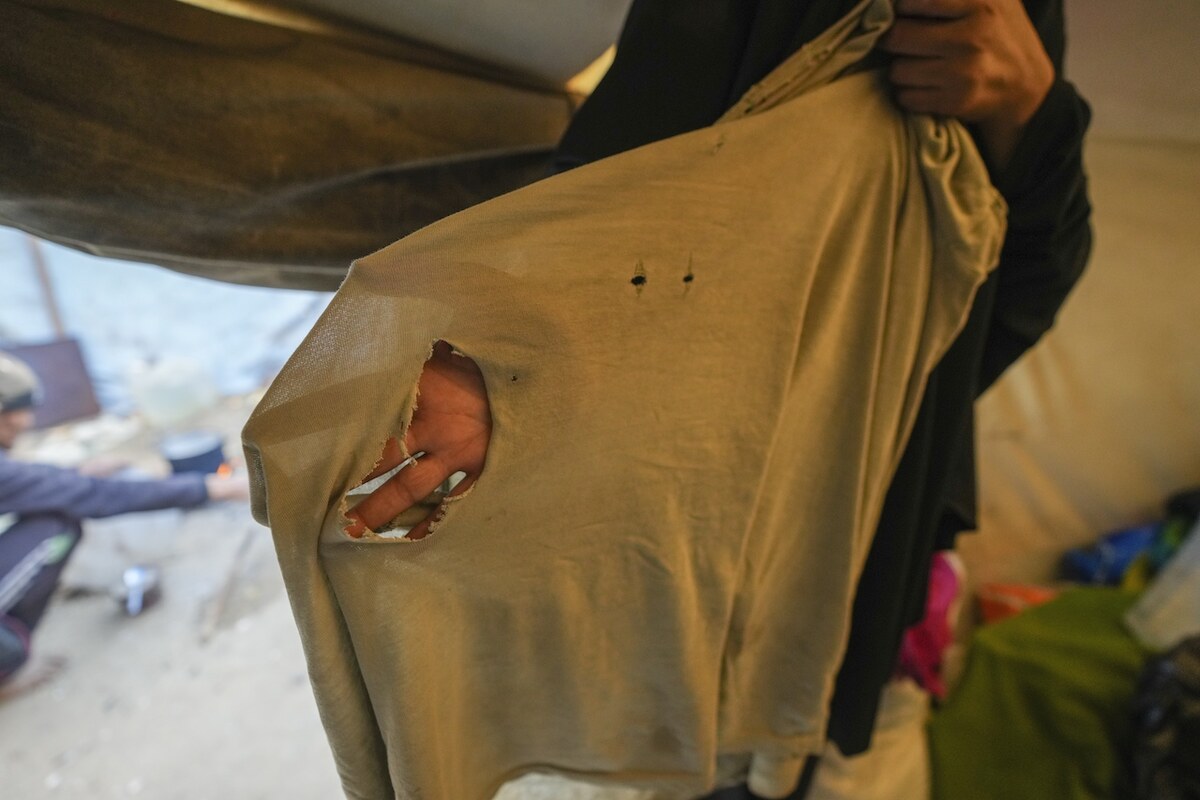DEIR AL-BALAH, Gaza City: For Gaza’s women, the hardships of life in the territory’s sprawling tent camps are compounded by the daily humiliation of never having privacy.
Women struggle to dress modestly while crowded into tents with extended family members, including men, and with strangers only steps away in neighboring tents. Access to menstrual products is limited, so they cut up sheets or old clothes to use as pads. Makeshift toilets usually consist of only a hole in the sand surrounded by sheets dangling from a line, and these must be shared with dozens of other people.
Alaa Hamami has dealt with the modesty issue by constantly wearing her prayer shawl, a black cloth that covers her head and upper body.
“Our whole lives have become prayer clothes, even to the market we wear it,” said the young mother of three. “Dignity is gone.”
Normally, she would wear the shawl only when performing her daily Muslim prayers. But with so many men around, she keeps it on all the time, even when sleeping — just in case an Israeli strike hits nearby in the night and she has to flee quickly, she said.

Women wait to receive donated food at a distribution center for displaced Palestinians in Deir al-Balah, Gaza Strip, on Dec. 17, 2024. (AP)
Israel’s 14-month-old campaign in Gaza has driven more than 90 percent of its 2.3 million Palestinians from their homes. Hundreds of thousands of them are now living in squalid camps of tents packed close together over large areas.
Sewage runs into the streets, and food and water are hard to obtain. Winter is setting in. Families often wear the same clothes for weeks because they left clothing and many other belongings behind as they fled.
Everyone in the camps searches daily for food, clean water and firewood. Women feel constantly exposed.
Gaza has always been a conservative society. Most women wear the hijab, or head scarf, in the presence of men who are not immediate family. Matters of women’s health — pregnancy, menstruation and contraception — tend not to be discussed publicly.
“Before we had a roof. Here it does not exist,” said Hamami, whose prayer shawl is torn and smudged with ash from cooking fires. “Here our entire lives have become exposed to the public. There is no privacy for women.”
Even simple needs are hard to meet
Wafaa Nasrallah, a displaced mother of two, says life in the camps makes even the simplest needs difficult, like getting period pads, which she cannot afford. She tried using pieces of cloth and even diapers, which have also increased in price.
For a bathroom, she has a hole in the ground, surrounded by blankets propped up by sticks.

Wafaa Nasrallah shows her sanitary pads at her tent in a camp for displaced Palestinians in Deir al-Balah, Gaza Strip, Saturday Dec. 28, 2024. (AP)
The UN says more than 690,000 women and girls in Gaza require menstrual hygiene products, as well as clean water and toilets. Aid workers have been unable to meet demand, with supplies piling up at crossings from Israel. Stocks of hygiene kits have run out, and prices are exorbitant. Many women have to choose between buying pads and buying food and water.
Doaa Hellis, a mother of three living in a camp, said she has torn up her old clothes to use for menstrual pads. “Wherever we find fabric, we tear it up and use it.”
A packet of pads costs 45 shekels ($12), “and there is not even five shekels in the whole tent,” she said.
Anera, a rights group active in Gaza, says some women use birth control pills to halt their periods. Others have experienced disruptions in their cycles because of the stress and trauma of repeated displacement.
The terrible conditions pose real risks to women’s health, said Amal Seyam, the director of the Women’s Affairs Center in Gaza, which provides supplies for women and surveys them about their experiences.
She said some women have not changed clothes for 40 days. That and improvised cloth pads “will certainly create” skin diseases, diseases related to reproductive health and psychological conditions, she said.
“Imagine what a woman in Gaza feels like, if she’s unable to control conditions related to hygiene and menstrual cycles,” Seyam said.

Alaa Hamami shows some of her deteriorated clothes inside her tent at a camp for displaced Palestinians in Deir al-Balah, Gaza Strip, Nov. 9, 2024. (AP)
‘Everything is destroyed’
Hellis remembered a time not so long ago, when being a woman felt more like a joy and less like a burden.
“Women are now deprived of everything, no clothes, no bathroom. Their psychology is completely destroyed,” she said.
Seyam said the center has tracked cases where girls have been married younger, before the age of 18, to escape the suffocating environment of their family’s tents. The war will “continue to cause a humanitarian disaster in every sense of the word. And women always pay the biggest price,” she said.
Israel’s campaign in Gaza has killed more than 45,000 Palestinians, over half of them women and children, according to the territory’s Health Ministry. Its count does not differentiate between combatants and civilians.
Israel launched its assault in retaliation for the Oct. 7, 2023, attack by Hamas on southern Israel, in which militants killed some 1,200 people and abducted around 250 others.
With large swaths of Gaza’s cities and towns leveled, women wrestle with reduced lives in their tents.
Hamami can walk the length of her small tent in a few strides. She shares it with 13 other people from her extended family. During the war, she gave birth to a son, Ahmed, who is now 8 months old. Between caring for him and her two other children, washing her family’s laundry, cooking and waiting in line for water, she says there’s no time to care for herself.
She has a few objects that remind her of what her life once was, including a powder compact she brought with her when she fled her home in the Shati camp of Gaza City. The makeup is now caked and crumbling. She managed to keep hold of a small mirror through four different displacements over the past year. It’s broken into two shards that she holds together every so often to catch a glimpse of her reflection.
“Previously, I had a wardrobe that contained everything I could wish for,” she said. “We used to go out for a walk every day, go to wedding parties, go to parks, to malls, to buy everything we wanted.”
Women “lost their being and everything in this war,” she said. “Women used to take care of themselves before the war. Now everything is destroyed.”




























